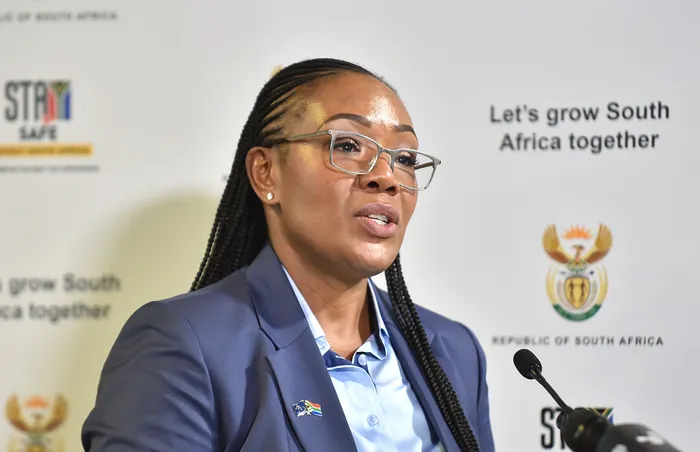
Auditor-General Tsakani Maluleke’s recent audit outcomes describe a recurring pattern: non-compliance, poor record-keeping and fruitless expenditure exceeding R11 billion in 2024, says the author.
Image: Independent Newspapers Archives
In Hans Christian Andersen’s timeless fable, the emperor’s procession glitters with splendour only in imagination. His courtiers, sycophants and onlookers nod approvingly, unwilling to admit what is plainly visible: that the emperor is, in truth, unclothed. It takes the innocent honesty of a child to break the illusion.
South Africa, too, marches in such a parade. The robes shimmer with acronyms, commissions and summits; the crowd applauds resilience even as data exposes fragility. The parade’s rhythm endures through ceremonies of promise and policies without consequence, while the nation’s foundations strain under the quiet weight of unfulfilled governance.
Governance, at its simplest, is principled stewardship: transparency, meritocracy and accountability in action. Yet it has become the unseen tailor of our times, invoked, costed and praised but rarely enforced. The numbers speak with an honesty no rhetoric can obscure. According to Statistics South Africa’s second-quarter report for 2025, overall unemployment remains at 33.2%, with youth joblessness at an alarming 62.2% and women constituting roughly 60% of the unemployed population. GDP growth hovers around 0.8% and the Gini coefficient at 0.63 ranks among the world’s most unequal. Transparency International’s 2024 index assigns the country a score of 41 out of 100, reflecting the erosion of institutional integrity.
The thesis is simple: South Africa’s challenge is not ignorance of what must be done but complacency with how little is done. The emperor is not alone; the crowd includes us all.
Every society constructs myths to survive itself. Ours is the myth of progress: the belief that policy by announcement equals transformation. Since 1994, an orchestra of frameworks has promised equity and growth, yet their music fades before the first chorus of implementation. Commissions of inquiry have filled shelves with truths unearthed and institutional renewal delayed. Reparations reached fewer than 80% of intended claimants and fewer than one in ten inquiry recommendations materialised in enforceable policy. Empowerment frameworks absorb between R145 billion and R290 billion annually, yet representation across key sectors remains below 20%.
The fiscal picture mirrors this drift. Public debt has climbed to roughly 72% of GDP, energy arrears exceed R94 billion and public-sector wages consume about 35% of the budget, crowding out infrastructure and skills investment. The result is a paradox: a government perpetually restructuring and a citizenry perpetually waiting.
History warns that governance erodes not in crises but in comforts. Each round of debt relief and each symbolic task force becomes a patch on the emperor’s robe. The applause endures because many depend on the illusion. Yet the data refuses complicity. Growth stagnates near 1% while governance-driven economies such as Vietnam, Indonesia and Rwanda have accelerated through disciplined accountability and institutional discipline.
Complacency, once a psychological refuge, has become an economic liability. It costs the nation between 2% and 4% of GDP annually through equity-compliance inefficiencies and lost productivity. It is governance ignored that sustains inequality entrenched.
The erosion of governance has travelled from parastatal boardrooms to municipal budgets, from procurement systems to public trust. Auditor-General Tsakani Maluleke’s recent audit outcomes describe a recurring pattern: non-compliance, poor record-keeping and fruitless expenditure exceeding R11 billion in 2024. Oversight exists, but consequence management seldom follows. Even the very organs meant to uphold oversight, including boards, executive committees and governance structures across public and private institutions, often reflect the same fatigue. Charters are reviewed and risk registers are maintained, yet ethical vigilance fades as accountability becomes procedural rather than principled. When governance turns administrative instead of moral, it loses the power to correct itself.
Foreign direct investment tells its own story. Beyond numbers, it reflects confidence in governance and policy coherence. While continental peers record a 75% rise in inflows, South Africa’s stagnation signals not a lack of opportunity but a deficit of trust in consistent execution. According to the UNCTAD 2024 World Investment Report, the country attracted about $5.1 billion in new FDI, less than half the inflows of Egypt or Morocco. This shortfall is not simply financial; it is a mirror of governance perception. Without a stable energy supply, regulatory certainty and credible oversight, investors defer rather than depart, waiting for the country to govern as boldly as it promises.
In health, the symbolic often triumphs over the substantive. The R200 billion funding gap identified by the Department of Health mirrors a broader trend: ambition unsupported by administrative coherence. Similar inertia shadows housing backlogs, water systems and digital infrastructure, where less than 40% of broadband targets have been met despite policy proclamations dating back a decade.
Governance once anchored the republic’s moral compass. Now it drifts amid the fog of expedience. Yet the drift is not confined to leaders. Civic participation has weakened. Voter turnout in the 2024 elections was only 58.6% despite surveys showing that nearly 80% of citizens believe the country is heading in the wrong direction. It is a portrait of resignation, of citizens critical of governance but disengaged from its correction.
This, in risk-management terms, is collective exposure. The absence of scrutiny multiplies vulnerabilities; unchecked systems invite systemic failure. If governance is the instrument of national control, then complacency is the hand that releases the brake.
The emperor, our institutions and policymakers continue the parade, yet the crowd’s silence completes the illusion. The few who speak, like Andersen’s child, are often dismissed as cynical or unpatriotic. In reality, they are the republic’s truest custodians.
Nations are judged not by the wealth they accumulate but by the inheritance they prepare. The numbers before us outline the balance sheet of complacency. If current trends persist, with growth below 2%, youth unemployment above 60% and inequality unaddressed, South Africa could approach 35% overall joblessness by 2030. Economic history offers a cautionary symmetry: when inequality surpasses the 0.60 threshold, unrest becomes not an anomaly but a statistical probability, as noted in World Bank social-stability models.
Yet this is not prophecy; it is preventable arithmetic. The antidote lies where the illness began: in governance. Recovery begins with reawakening consequence, merit and transparency as enforceable standards rather than ceremonial virtues. It demands that oversight bodies operate beyond symbolic visibility and that fiscal discipline replaces moral pleading.
Generational stewardship must replace generational rhetoric. Our heirs should inherit institutions that function, not frameworks that console. The country’s debt exposure, estimated at R6 trillion by 2026 and the annual loss of over R100 billion to illicit financial flows underscore the urgency. Without renewal, the next generation will manage liabilities, not legacies.
Still, national revitalisation is possible. South Africa retains formidable human capital, resilient markets and a constitutional design envied worldwide. What falters is the ethical software of governance, the civic code that translates vision into verifiable outcomes. A governance renaissance would mean treating transparency not as virtue signalling but as infrastructure: audited, measured and enforced.
In this awakening, the role of society is not peripheral. Complacency must be reframed as a national risk factor, tracked with the same discipline as inflation or debt. Apathy, after all, compounds interest on injustice. Civic courage, conversely, yields democratic dividends such as trust, participation and accountability.
The fable’s lesson endures. The emperor’s nakedness was never the scandal; it was the crowd’s silence. In our own parade, the courage of one voice, one principled auditor, one honest official, one engaged citizen can alter the rhythm. South Africa’s challenge is to multiply such voices until governance becomes not an aspiration but a reflex.
What inheritance awaits tomorrow’s custodians? A resilient framework or a fragile façade?
As Steve Biko reminded a generation before us, true liberation begins when minds free themselves of inherited obedience. Governance must rediscover that freedom. Visibility, accountability and courage are the robes that fit a republic.

Nomvula Mabuza.
Image: Supplied
Nomvula Zeldah Mabuza is a Risk Governance and Compliance Specialist with extensive experience in strategic risk and industrial operations. She holds a Diploma in Business Management (Accounting) from Brunel University, UK, and is an MBA candidate at Henley Business School, South Africa.
*** The views expressed here do not necessarily represent those of Independent Media or IOL.
BUSINESS REPORT